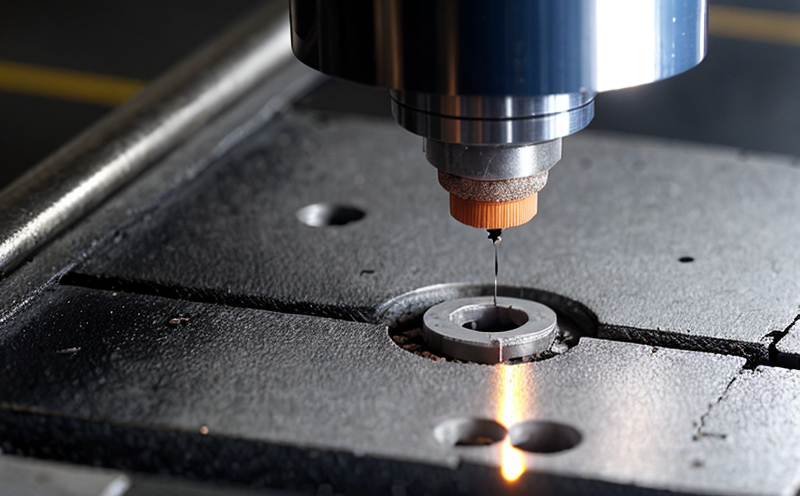ASTM F1400 Low-k Dielectric Failure Testing
The ASTM F1400 standard is a critical benchmark in semiconductor and microchip testing. It focuses on the evaluation of low-k dielectrics, which are essential for modern integrated circuit (IC) manufacturing, especially in advanced node technologies. Low-k materials are chosen for their low dielectric constant properties, allowing for higher performance and lower power consumption in ICs.
The standard provides a comprehensive framework to assess the reliability of these materials under various stress conditions. This includes high-temperature cycling, humidity challenges, and mechanical stresses that can lead to failure. Failure analysis is crucial for identifying defects early in the development process, ensuring product quality, and enhancing overall design robustness.
ASTM F1400 testing helps manufacturers meet stringent industry standards such as ISO 9001, IEC 62368, and EN 50600. This ensures compliance with global regulatory requirements, making products more competitive in the market. The testing process involves rigorous specimen preparation, where low-k samples are subjected to a series of stress tests. These include thermal cycling, humidity exposure, and mechanical stress simulation.
The instrumentation used for ASTM F1400 includes advanced scanning electron microscopes (SEM), transmission electron microscopes (TEM), and focused ion beam systems (FIB). These tools provide high-resolution imaging that can detect even the smallest defects. The acceptance criteria are based on international standards, ensuring consistent results across different laboratories.
Failure analysis in ASTM F1400 involves a detailed examination of the samples post-stress testing to identify any cracks or other anomalies indicative of failure. This process is crucial for understanding how and why failures occur, which helps in improving product design and manufacturing processes. The insights gained from this testing are invaluable for R&D engineers looking to innovate and stay ahead in the competitive semiconductor industry.
ASTM F1400 ensures that low-k dielectrics perform reliably under extreme conditions, making it an indispensable tool for quality assurance departments. By leveraging ASTM F1400, manufacturers can enhance their reputation for producing high-quality, reliable products, which is essential in today’s fast-paced market.
The standard's broad applicability extends to various sectors, including consumer electronics, automotive, and telecommunications, where the reliability of ICs is paramount. Compliance with ASTM F1400 not only meets regulatory requirements but also demonstrates a commitment to excellence that resonates well with end-users.
Why Choose This Test
- Comprehensive Failure Analysis: Comprehensive examination of low-k dielectric materials under various stress conditions.
- International Compliance: Ensures adherence to global standards, enhancing marketability and regulatory compliance.
- Expertise in Instrumentation: Utilization of advanced scanning electron microscopes (SEM) and transmission electron microscopes (TEM).
- Data-Driven Insights: Provides detailed reports that offer valuable insights into the reliability of low-k dielectrics.
The ASTM F1400 test is particularly beneficial for manufacturers who need to ensure the durability and performance of their products in challenging environments. By choosing this test, they can gain a competitive edge by identifying potential issues early in the development process, thereby improving product quality and reliability.
Moreover, the test's focus on real-world stress conditions ensures that the findings are relevant and applicable to actual use cases. This makes it an invaluable tool for R&D teams looking to innovate and improve their products continuously.
Environmental and Sustainability Contributions
The ASTM F1400 Low-k Dielectric Failure Testing contributes significantly to environmental sustainability by promoting the development of more reliable and efficient semiconductor devices. By ensuring that low-k dielectrics perform consistently under stress, this testing helps minimize product failures in the field, reducing the need for replacements and repairs.
Additionally, the insights gained from ASTM F1400 help manufacturers design products with longer lifespans, which translates to reduced waste and a smaller carbon footprint. The standard also supports the development of more energy-efficient devices, contributing to overall environmental sustainability in the electronics industry.
The testing process itself is conducted in controlled laboratory environments that prioritize energy efficiency and resource conservation. This aligns with broader sustainability goals within the semiconductor sector, where reducing the ecological impact of manufacturing processes is a key focus.
By choosing ASTM F1400 for their quality assurance programs, manufacturers can contribute to a more sustainable future while maintaining high standards of product reliability and performance.
Competitive Advantage and Market Impact
The ASTM F1400 Low-k Dielectric Failure Testing is not just about compliance; it's also about gaining a competitive edge in the market. By offering robust, reliable products, manufacturers can differentiate themselves from competitors who may not adhere to such stringent testing standards.
Compliance with ASTM F1400 ensures that products meet or exceed global quality and safety standards, which is increasingly important for international markets. This can lead to increased customer trust and loyalty, as consumers are more likely to choose brands known for their commitment to excellence.
The insights gained from this testing can also drive innovation within the organization. By identifying potential weaknesses in design early on, manufacturers can address them before they become significant issues. This proactive approach fosters a culture of continuous improvement, which is crucial in today's rapidly evolving technology landscape.
Moreover, ASTM F1400 compliance can open doors to new markets and partnerships. Many global customers have stringent quality requirements that align with this standard. By meeting these expectations, manufacturers can expand their reach and form strategic alliances that benefit both parties.
The test's emphasis on real-world stress conditions ensures that the products perform reliably in actual use cases. This reliability is a key differentiator in competitive markets where performance and durability are critical factors for customer satisfaction and retention.





